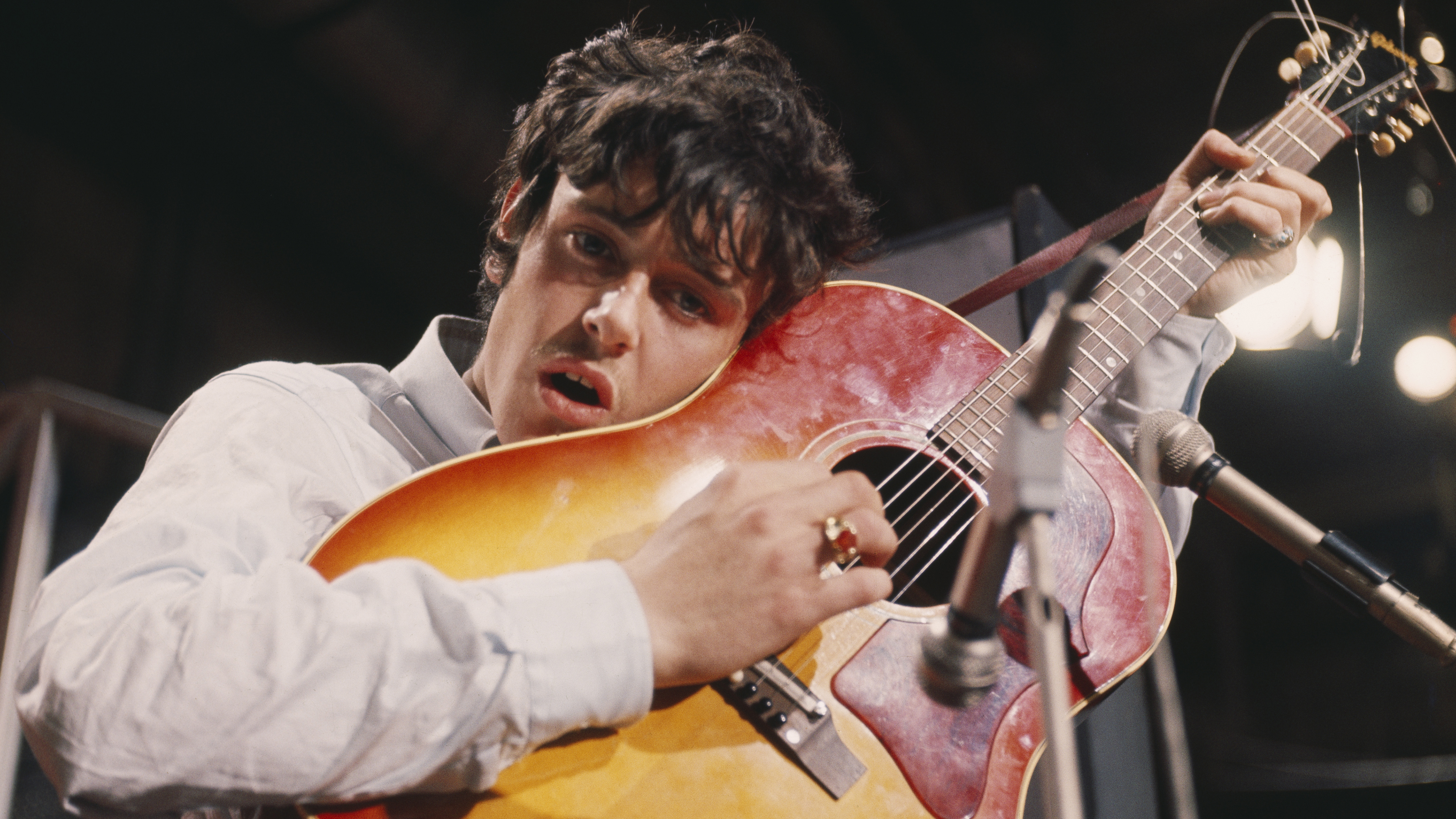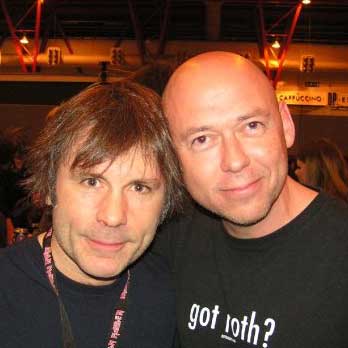“My producer Mickie Most said, ‘We can’t let a wild boy like Hendrix in there. We have to control the song, Don’”: ’60s icon Donovan tells the story of the “heavy metal folk” song that connects him to Hendrix, Led Zeppelin and The Beatles
But was Hurdy Gurdy Man really the template for Stairway To Heaven?

Want all the hottest music and gear news, reviews, deals, features and more, direct to your inbox? Sign up here.
You are now subscribed
Your newsletter sign-up was successful
In 1968, folk singer Donovan was in India, studying transcendental meditation with The Beatles, when he finished writing a groundbreaking song that would become one of his biggest hits.
He named it Hurdy Gurdy Man, and for many years it was said that Donovan was backed on this song by three of the musicians who went on to form Led Zeppelin.
In fact, Donovan had originally wanted Jimi Hendrix to play on Hurdy Gurdy Man – and would have given the song to Hendrix if producer Mickie Most hadn’t stopped him.
It is an amazing story, which Donovan now tells to MusicRadar ahead of his 60th Anniversary concert at Richmond Theatre in London on 12 October.
The story begins with a treasured guitar, the Gibson J-45 he bought in Los Angeles in the year in which he scored his first hit single with Catch The Wind.
Donovan recalls: “In late ’65 I walked into a guitar store on Sunset Boulevard and I bought that J-45 and I never changed. So the J-45 was the actual guitar that I wrote Hurdy Gurdy Man on.
“I was hanging out with Bert Jansch and other guitar players of note, and at one point we used to lower the action on the strings. You can take the guitar strings down to almost touching the frets, and when we were jamming with the strings down, they were buzzing.”
Want all the hottest music and gear news, reviews, deals, features and more, direct to your inbox? Sign up here.
It was in February of 1968 that Donovan traveled to Rishikesh in India to the ashram of Maharishi Mahesh Yogi, where he explored meditation and shared musical ideas with all four of The Beatles. Also in this entourage were Mike Love of the Beach Boys, actress Mia Farrow and her sister Prudence, who inspired the song Dear Prudence on The Beatles’ White Album.
“I started writing Hurdy Gurdy Man before I went to India, but completed it in India,” Donovan says. “And one night, just after I got back to my little cottage in Hertfordshire, I was in my bed with a guitar that had strings lowered, and I'm listening to the buzz, but this time I’m not doing Arabic or Indian riffs, which we all love – all guitar players love. I'm doing chords. A to C to G. It’s like a mantra. But also I heard electric sounds in my head.
“As I play it, the strings are buzzing, and I'm working through these lyrics I've written in India, and it suddenly flashes in my mind – I'd heard that there was a band called The Hurdy Gurdy Men, and it occurred to me, ‘What is a hurdy gurdy man?’
“I looked it up, and it was a guy who used to travel with a hurdy gurdy instrument and was telling the news. But that wasn't what I was writing the song about.
“Really, I was writing the song about what I'd experienced and all the books that The Beatles and I had read about meditation and esoteric studies and the inner world. So this song was going to speak about meditation.”
It was shortly after his return to England that Donovan was contacted by his producer Mickie Most, with whom he had cut four Top 10 UK hits – including Sunshine Superman, which featured Jimmy Page on electric guitar and John Paul Jones on bass.
Donovan says: “My producer, Mickie Most – my super producer – was always saying, ‘The single that we’ve just released that’s on the top of the charts is going to drop because other people are buying other singles. And when that happens, Don, I’m going to call you, and you’ve got to come to see me and tell me what your new three songs are. And I'll choose the next single.’ He knew. He just knew.
“So this time I went to Mickie with Hurdy Gurdy Man and two or three other songs, and I already had it in my head how Hurdy Gurdy Man was going to sound from that buzz – because it sounded like distorted guitar.
“Only once before had I played an electric guitar that sounded a little bit distorted, and that was on Season Of The Witch. But that was an electric guitar, and I preferred the acoustic.
“So I played Hurdy Gurdy Man for Mickie and he said, ‘What do you hear on it?’ I said, ‘I hear my vibrating vocal, it’s a mantra, and it needs an acoustic guitar opening. And then I want to hear mad pagan bodhrán Irish drums, but on a real kit. And distorted electric guitar like Dave Davies or Pete Townshend.’
“And Mickie says, ‘Okay, I think we're going to have to have some help. I don't know how we're going to pull this off, but once again, Don, I think what you've done is just like we did in Sunshine Superman – you've brought various elements together that nobody else has put together yet. So let’s record it – but we need JPJ.’”
JPJ was of course John Paul Jones, who not only played bass on Sunshine Superman but also served as arranger on another of Donovan’s hits, one that would become his signature song – Mellow Yellow.
In addition to Jones, Donovan had another collaborator in mind for Hurdy Gurdy Man.
“I told Mickie, ‘I’m hearing power guitar. I want you to call up Hendrix.’ But Mickie said, ‘We can't make records like that. Hendrix is a wild, freestyle, improvisational guitar player, and we have to control the song, Don – just like we did with JPJ on Mellow Yellow. It has to be verse, chorus, verse, chorus, a break, verse, chorus, chorus, chorus and out. It’s only three minutes. We can't let a wild boy like Hendrix in there!’
“And it was true. Mickie was right. But Hendrix wasn’t available anyway.
“So then I said, ‘Well, if we can’t have Jimi, give him the song.’ But Mickie said, ‘No – this is yours.’ And when he said that, I replied, ‘You're right. Let's do it.’”
Hurdy Gurdy Man was recorded in London in April 1968, with John Paul Jones a key figure as both arranger and bassist.
Donovan recalls: “When the actual session started, Mickie said to JPJ, ‘Don wants to do something. And it's another one of his fusions, like he did on Season Of The Witch.’ And that’s how it started.”
It was in the last quarter of 1968 that Jones became a member of Led Zeppelin alongside Jimmy Page, drummer John Bonham and singer Robert Plant.
Contrary to popular myth, Page and Bonham were not involved in the recording of Hurdy Gurdy Man. Nor was another guitarist who went on to become a famous virtuoso – Allan Holdsworth.
On some official Donovan releases, including 1992 anthology The Definitive Collection, the names of Page, Bonham and Holdsworth were all listed as performers on Hurdy Gurdy Man.
But on a new deluxe edition of The Hurdy Gurdy Man, the parent album, the credits for the title track are as follows: Donovan (vocals, acoustic guitar, tamboura), John Paul Jones (electric bass, arrangement), Alan Parker (electric guitar) and Clem Cattini (drums).
This information, according to Donovan, is 100% accurate. He says now: “It is officially stamped by JPJ – who played what. Whereas over the years it was, ‘Oh, Bonham played some of the drums.’ And Bonham said, ‘Yeah, I played on that.’ But I think it was all wishful thinking, and it was all mixed up with what Zep would actually do themselves.”
When the recording of Hurdy Gurdy Man was complete, Donovan received glowing praise from his trusty sidekick and former hitchhiking companion – known to all as Gypsy Dave.
Donovan remembers: “When Gyp heard the song, he said, ‘Don, I can only describe it as one thing – heavy metal folk.’ The he said, ‘People are going to be in awe of you. They won't know what the fuck they're listening to.’”
Donovan says that the high praise did not end there. “People have said that Hurdy Gurdy Man was the actual template for what Page and JPJ would create in a band called Led Zeppelin.”
He pauses and smiles: “Now, I can’t tell you that Hurdy Gurdy Man created Led Zeppelin, but what I can tell you is this: if you play Stairway To Heaven from the first needle touch to the end, you will hear acoustic guitar opening, esoteric, trippy, magical lyrics, heavy out-of-this-fucking-world drum patterns and very distorted guitar.”
He continues: “When they put that band together, Led Zeppelin, what was extraordinary, more than anything, was that Gyp said, ‘What you've created here, you're going to be surprised what’s going to happen.’”
Hurdy Gurdy Man was released as a single in May 1968 and reached No.4 in the UK and No.5 in the US.
Of all the great songs that Donovan wrote and recorded, this was one of the most original and influential.
Donovan plays his 60th Anniversary concert at Richmond Theatre, London on 12 October

Paul Elliott has worked for leading music titles since 1985, including Sounds, Kerrang!, MOJO and Q. He is the author of several books including the first biography of Guns N’ Roses and the autobiography of bodyguard-to-the-stars Danny Francis.
You must confirm your public display name before commenting
Please logout and then login again, you will then be prompted to enter your display name.




